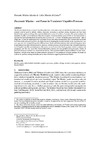Identificador persistente para citar o vincular este elemento:
https://accedacris.ulpgc.es/jspui/handle/10553/42186
| Título: | Fascinatin’ rhythm – and pauses in translators’ cognitive processes | Autores/as: | Martín, Ricardo Muñoz De León, Celia Martín |
Clasificación UNESCO: | 570112 Traducción | Palabras clave: | Baseline pause Individualized thresholds Cognitive processes Problem solving Hesitation, et al. |
Fecha de publicación: | 2018 | Editor/a: | 0904-1699 | Publicación seriada: | Hermes (Denmark) | Resumen: | The Monitor Model fosters a view of translating where two mind modes stand out and alternate when trying to render originals word-by-word by default: shallow, uneventful processing vs problem solving. Research may have been biased towards problem solving, often operationalized with a pause of, or above, 3 seconds. This project analyzed 16 translation log files by four informants from four originals. A baseline minimal pause of 200 ms was instrumental to calculate two individual thresholds for each log file: (a) A low one – 1.5 times the median pause within words – and (b) a high one – 3 times the median pause between words. Pauses were then characterized as short (between 200 ms and the lower threshold), mid, and long (above the higher threshold, chunking the recorded activities in the translation task into task segments), and assumed to respond to different causes. Weak correlations between short, mid and long pauses were found, hinting at possible different cognitive processes. Inferred processes did not fall neatly into categories depending on the length of possibly associated pauses. Mid pauses occurred more often than long pauses between sentences and paragraphs, and they also more often flanked information searches and even problem-solving instances. Chains of proximal mid pauses marked cases of potential hesitations. Task segments tended to happen within 4–8 minute cycles, nested in a possible initial phase for contextualization, followed by long periods of sustained attention. We found no evidence for problem-solving thresholds, and no trace of behavior supporting the Monitor Model. | URI: | https://accedacris.ulpgc.es/handle/10553/42186 | ISSN: | 0904-1699 | DOI: | 10.7146/hjlcb.v0i57.106192 | Fuente: | Hermes (Denmark)[ISSN 0904-1699],v. 57, p. 29-47 |
| Colección: | Actas de congresos |
Citas SCOPUSTM
14
actualizado el 08-jun-2025
Visitas 5
793
actualizado el 15-ene-2026
Descargas
240
actualizado el 15-ene-2026
Google ScholarTM
Verifica
Altmetric
Comparte
Exporta metadatos
Los elementos en ULPGC accedaCRIS están protegidos por derechos de autor con todos los derechos reservados, a menos que se indique lo contrario.
